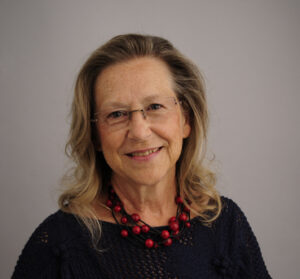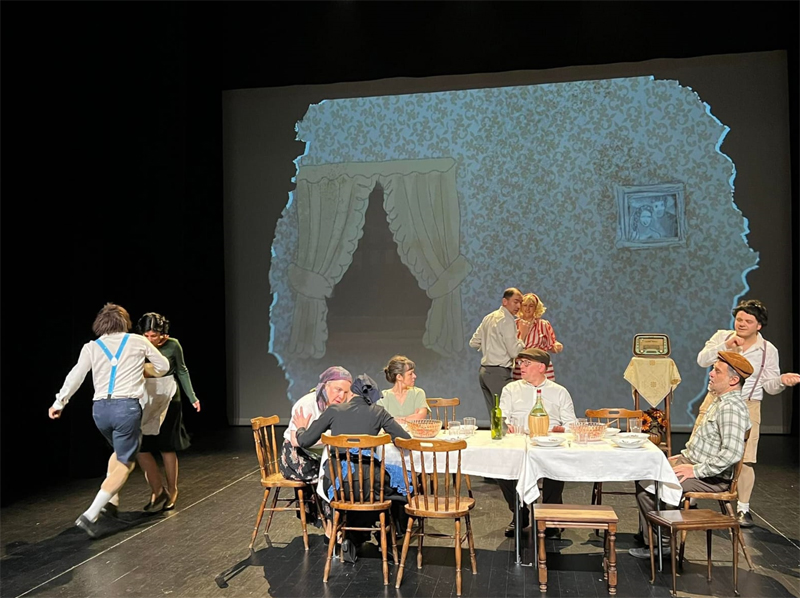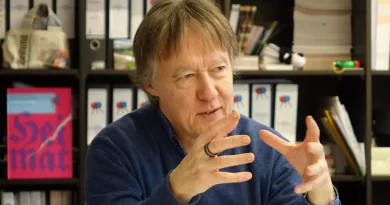Perfecting a Foreign Language through Theatre: Teatrolingua
An interview with company founder Luisella Suberni Piccoli by Dana Rufolo

Photo courtesy Teatrolingua.
As readers know, Plays International & Europe doesn’t report on amateur theatre, so the present article is an exception to the rule. This interview is with the Italian-Luxembourgish artistic director of the theatre group Teatrolingua. Luisella Suberni Piccoli began the group as an Italian language-learning venture in 2004 in the multilingual country of Luxembourg. Her viable theatre company is an example of how the country’s artistic community goes about solving the problem of maintaining cultural variety in a tiny European country known for its banks, financial sector, European Union headquarters, and steel manufacturing.
Luisella Suberni Piccoli was interviewed by Dana Rufolo in Luxembourg on April 1st, 2023.
You write that: “Teatrolingua is a tangible proof of the multiculturalism that is a characteristic of the Grand Duchy of Luxembourg”. Significantly, although your performances are in Italian, yours is not a company of Italian actors but is composed of “approximately 20 people representing 15 different nationalities who, through the means of theatre, perfect their knowledge of the Italian language and culture.” Can you tell me more about how the company developed and is sustained?
Everything stems from the fact that I am a teacher of Italian as a foreign language for adult students. I discovered that there is nothing better than teaching language fluency through theatre.

The company.
Photo courtesy Teatrolingua.
You write that after initially staging your plays at the National Institute of Languages in 2010 you went independent and received some organizational support from two Italian institutes of culture in Luxembourg, Società Dante Alighieri and Convivium, as well as from the Italian Embassy and the Neumünster Abbey which agreed to lease you their sought-after theatre for your annual performance. You also started touring your productions – not only in Italy (Trieste, Torino, Venice, Florence, Rome, Padua) but also at times in France, Belgium and Spain. What do you feel you have you achieved since Teatrolingua became independent?
Since 2010, Teatrolingua performs annually at the Abbaye de Neumünster in Luxembourg, two evenings in a row. And the public returns every year. Each year, we have about 500 audience members. [This is a large public in language-splintered Luxembourg.] I’m the artistic director, but I’m fortunate to work with precious collaborators. Each production has music composed specifically for it by the musician Pier Renzo Ponzo who lives in Turin. Eliza Fessler is the graphic artist whose projections, videos and animated films are used in the plays regularly also.
I also make sure that we go on tour. I want the actors to experience Italy a bit. We go to the places that are connected to the author. For example, when we produced Goldoni, we went to Venice, the playwright’s home town. With La Memoria di una balena, we will perform in San Demetrio ne’ Vestini in the province of L’Aquila in the Abruzzo region of Italy on 7th May 2023. This tiny village of 1,800 persons which has a well-equipped theatre, is the source of many immigrants to Luxembourg. The family of Jean Portante – who wrote the novel that inspired me – originates there. The mayor invited us and has offered various forms of support. We’ve also performed at a Festival of Theatre in Foreign Languages in Madrid. All the same, we each pay our travel expenses and live off our percentage of box office returns. It isn’t like we get the red carpet rolled out for us!
Your latest production, during the month of March, 2023 – “La Memoria di una balena – Storia di Tina” (“A Whale’s Memory or Tina’s Story”) which is a play you wrote based on the novel “La Mémoire de la Baleine” (“The Memory of the Whale”) by Luxembourg author Jean Portante, flows smoothly despite its many scene changes and the use of music, videos, artistic projections.
Yes, one of the characteristics of my style is that there are multiple scene changes; in “La Memoria di una balena” there are 25 scene changes. Costume changes, scene changes, musical interludes: everything is timed to the second.
Additionally, your actors are well trained. Their Italian is almost accent-free, the dialogue is clear, they keep up the dramatic action. I know you have many degrees as a teacher of languages and as an actress and director – including from the School of Dramatic Arts in Trieste and the Conservatory of Luxembourg (stage director courses) and you were awarded an Italiani nel mondo prize from Rome for the cultural merit of your work. What is your methodology as a director for improving the educational quality of the theatrical experience?
Theatre as a didactic instrument is special, because the process is just as important as the final production. During the development of the play, I adapt lines from time to time. A word is too difficult to pronounce, or a sentence doesn’t flow the way an actor says it – so, I substitute new words that flow easily.
I make it my objective to acquaint myself with the personality of each of my student-actors – their character and strengths on stage, their vocal and articulatory musculature, their capacities – and then when I write a play myself, which is the exception, or more usually when I adapt a classic, I create roles with a particular actor in mind. It helps that the bulk of the company has remained constant for several years now, but new actors join the core group regularly to replace the leaving ones.
Additionally, during the year we spend developing one production, I take my cast on a tour of all the great Italian writers and also show them the way people interact in Italian culture. This background makes them more authentically Italian on stage.

The cast of La Memoria di una balena.
Photo courtesy Teatrolingua.
What are the practical aspects of directing Teatrolingua?
We rehearse every Wednesday evening and produce one play a year over two days. That’s our goal, and in preparation we rehearse all through the year. We learn vocabulary, I teach them pronunciation and also Italian culture – depending on which work I am adapting, the actors are introduced to Machiavelli, or La Divina Commedia by Dante Alighieri, Ludovico Ariosto, Carlo Gozzi who was the defender of commedia dell’arte and Carlo Goldoni’s enemy. The year I staged Goldoni, I didn’t present just one particular Goldoni play but I interwove four of his plays to create a new work.
It’s difficult to rehearse sufficiently, because everyone has a family, work. Physical theatre techniques is something extra I’d like to have the time to work on more. But actors fall ill, have family problems. In a group composed of 17-20 actors, it’s not easy certainly. Understudies have to take over sometimes, and the costumes have to be adjusted. It is a question of motivation. As the director of course my motivation is the strongest of all. But in my experience in the end, everyone is there; and on stage everyone gives their best. We have developed an incredible energy, collaborative spirit, and friendships. As many actors often say, we are a second family.
Next year, I intend to adapt Il Codice di Perelà (Man of Smoke) by Aldo Palazzeschi, one of the first Italian Futurists.
Translated from the French by Dana Rufolo









